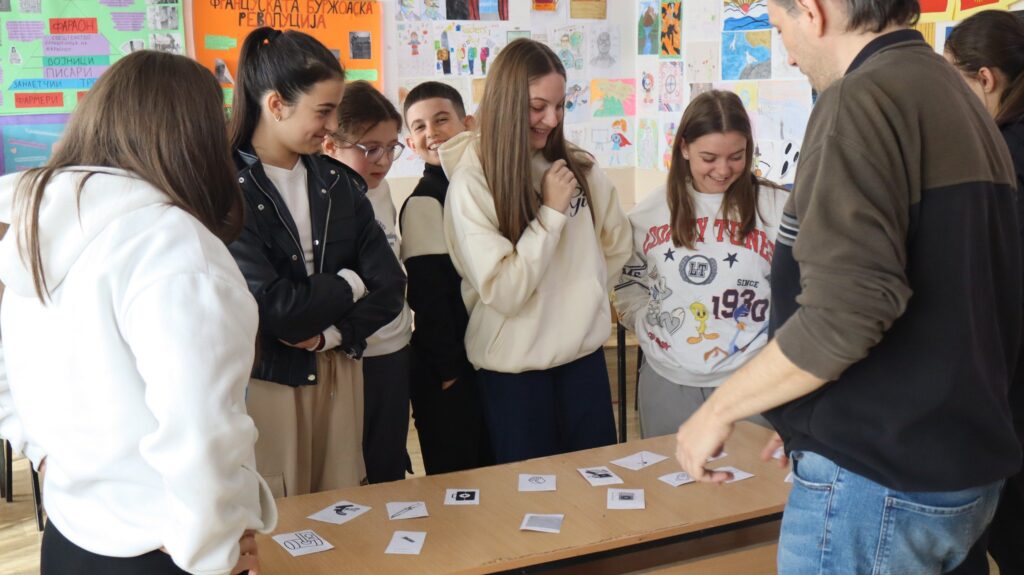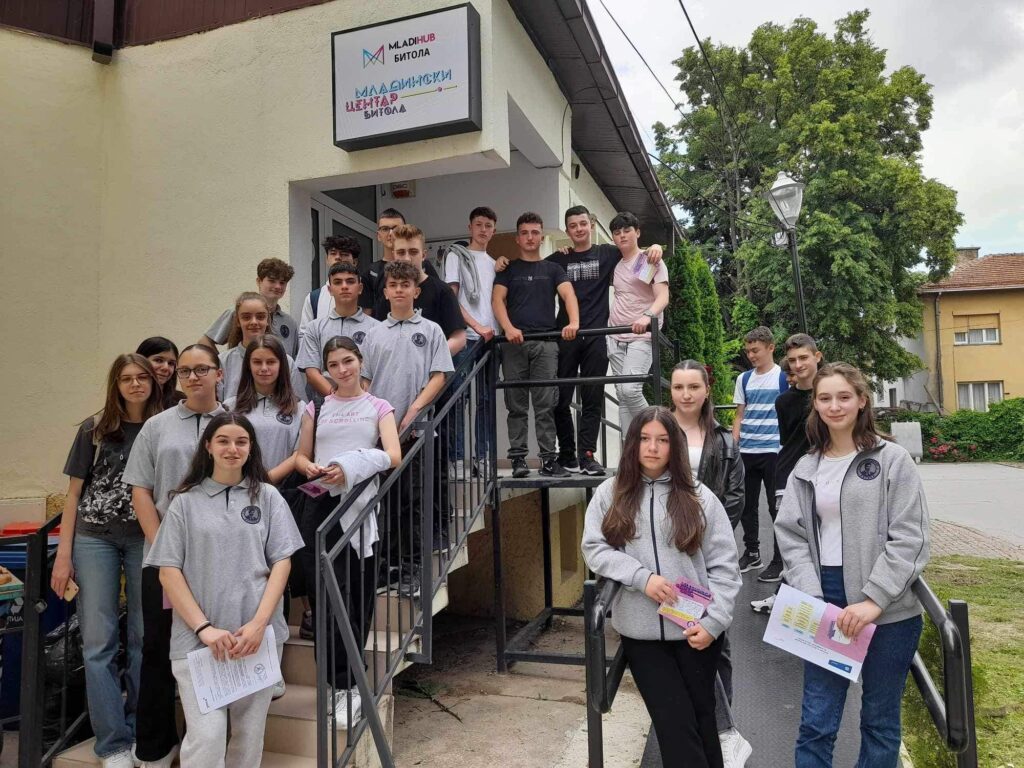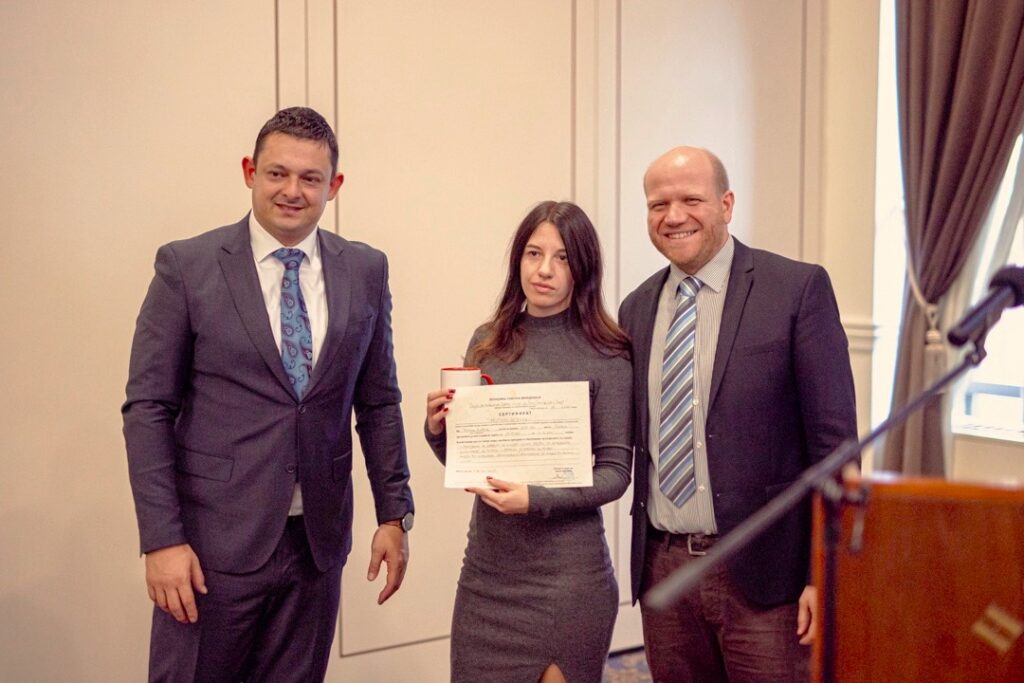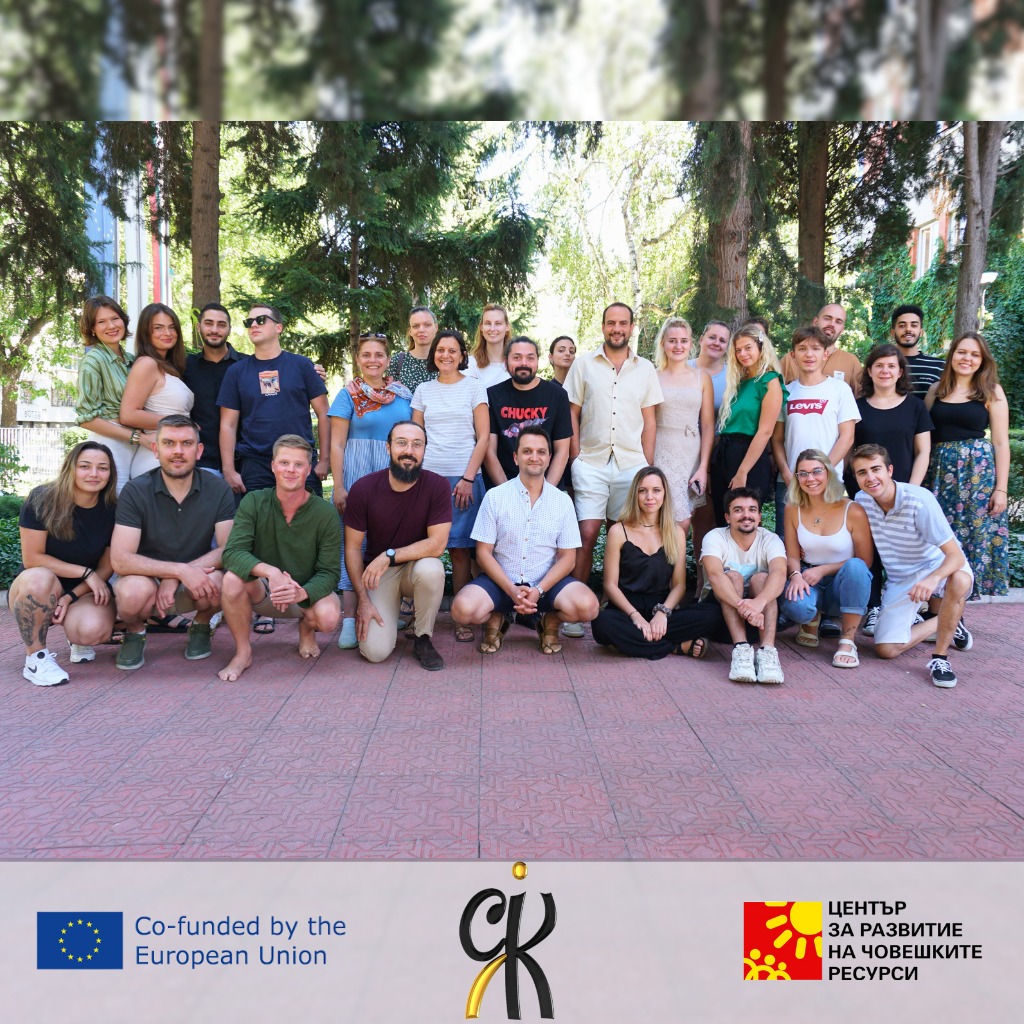Empowering Students in Mogila Through Non-Formal Education

Latest News Empowering Students in Mogila Through Non-Formal Education As part of our efforts to make youth work accessible in rural areas in October and November 2025 we delivered activities for non-formal education of young people in the Municipality of Mogila. Our team of youth workers held a series of three workshops in the Goce Delchev Primary School in the Municipality of Mogila. The workshops aimed to strengthen the capacities of the student organization in this school so that students themselves can create and implement initiatives that contribute to creating a safer school environment. The workshops were attended by the presidents and deputies of all classes, as well as the school’s children’s ombudsman, students aged 12 to 15. At the beginning, they talked about how they understand communication, what verbal and non-verbal communication means to them and how these elements affect their relationships. They also talked about what constitutes conflict, how they recognize it and where it is right to report it. Then the students practiced decision-making – individually and in groups – and analyzed the factors that influence a group communication to be successful and useful. This was followed by a session with a discussion on how to hold meetings, ways of keeping minutes, how to process agenda items and how to draw conclusions. The students described the meetings they had had so far in the school and compared them with the good practices they had learned. Each class was given a task – in pairs to draft a petition or official request to the Principal, based on a need that their classmates had highlighted as significant. The next workshop was where the children were introduced to the basics of research work. The students learned to choose and use tools for collecting information from larger groups of children, such as surveys, questionnaires and interviews. Each team conducted research in the school, processed the results and presented them at the last workshop. As an additional activity, they drew their “ideal school”, and then compared the idea with the real situation, analyzing what could be improved. This exercise encouraged them to think about a student initiative that would have the greatest significance for their school. In the discussions, most of the students expressed a desire for the initiative to be creative and supportive. Thus was born the idea for “Comics that Change” – the creation of comics by students under the mentorship of Macedonian language and art teachers, with the aim of creating a student comic book – a collection of topics important to the school and the community: student participation, violence prevention and ecology. These will then be printed on paper and will be part of the regular program of the school’s patron saint holiday, which is celebrated every spring and is a significant event in this local community. The overall initiative in this way helps to raise the level of safety, trust and openness between students and professional service and contributes to a better school environment for future generations. In order to promote non-formal education in rural areas, YMCA cooperates with various partners. These activities enter in a broader initiative of the Coalition of Youth Organizations SEGA, in partnership with the Macedonian Center for Civic Education, the First Children’s Embassy in the World Megjashi and SmartUp – Social Innovation Lab, with support from the Pestalozzi Children’s Foundation, which is being implemented in the period September 2023 – August 2026. Thanks to the support of Y’s Men International, we are in a position to implement a series of new workshops in other rural areas as well.
Peer Education Expands to Primary Schools in Bitola

Latest News Peer Education Expands to Primary Schools in Bitola Following the successful work with high school students in the first semester, the “Peer Education School against Peer Violence” program of YMCA continued into the second semester with a new focus: upper-grade primary school students. Out of the ten primary schools in Bitola, nine joined the initiative by selecting two to three motivated students from 8th and 9th grade to participate in the program. Their enthusiasm reflected the relevance of the topic – peer violence and the need to talk more openly about it. Over a period of two months, participants were divided into two groups and went through four thematic modules, adapted to their age and understanding. The topics mirrored those used with high school students: communication styles, the concept of power and influence, types of violence (physical, psychological, social, and cyber), and non-violent communication as an approach everyone can learn and apply in daily life. Each session offered space for reflection, learning, and building empathy among peers. The creative expression workshop looked a bit different from the one for older students. Instead of guided meditation, younger participants were encouraged to select an image that reminded them of peer violence or its consequences and then represent it through drawing and personal interpretation. The goal was to express their emotions and experiences in a safe and creative way. All sessions were facilitated by a psychologist and youth worker from the YMCA with support from a local artist during the art workshop. After completing the four modules and the art session, the trained students (now peer educators) carried out presentations and workshops in their own classrooms by the end of May 2025. These peer-led activities were well received by school staff, psychologists, and, most importantly, the students themselves. At the end of the school year, a formal certificate ceremony was held to recognize their efforts and completion of the program. The students also proudly exhibited their artwork from the creative session as testimony of their work and dedication. Twenty students completed the program, reaching over 350 peers in primary schools across the city. The experience helped them grow as leaders and advocates for a more supportive and safer school environment. The project “Peer School Against Peer Violence” run by the YMCA is a continuation of the peer education initiative at the Youth Center in Bitola on topics related to mental health, relevant to young people and the Municipality itself. The project is supported by Signs of Hope (CVJM) and the Municipality of Bitola and is implemented in cooperation with nine primary schools in the city.
Youth Center Bitola: 2024 by the numbers

Latest News Youth Center Bitola: 2024 by the numbers In May 2023, the Youth Center was opened in Bitola, with the aim of providing a safe and inclusive space through various programs, activities and mentoring, where we aim to encourage personal development, cultivate leadership skills and create a sense of belonging among young people. The Youth Center itself is managed by 3 youth organizations from Bitola, YMCA, Sfera International and MKC. After a successful 2023, with a total of 2,651 beneficiaries and more than 200 activities held, the work of the youth center continued with even greater enthusiasm and desire for as many participants and activities as possible. In relation to the 8 previously set specific goals of this center, program activities were offered that have been largely fulfilled. A safe space is provided where young people can spend their free time, develop their competencies, encourage their entrepreneurial spirit, promote healthy lifestyle habits, as well as raise environmental awareness, inform about opportunities for informal education, strengthen active citizenship and promote volunteering. In the reporting period from January 1 to December 31, 2024: 4,469 beneficiaries were covered by over 300 different activities, many of which were held multiple times. The activities were offered by youth workers or by different youth work providers, i.e. over 15 different youth work providers used the spaces of the Youth Center Bitola to carry out their activities. The most visited topics were digital education, mental health, environment, youth participation and youth policies as well as entertainment/social activities. We would like to highlight two program activities, led by the YMCA: The Digital Education Club is one of the most visited clubs in the center for the second year in a row, aiming to achieve greater digital literacy among young people, as well as The Peer School for Mental Health and Children, which with 60 peer educators, included around 2.000 participants in all schools in the Municipality of Bitola, as well as the Peer School against Peer Violence, which included around 170 participants from the high schools. The activities of this school continue in 2025, with a focus on students from primary schools in the Bitola. The results of the work of the Youth Center Bitola in the period from January 1 to December 31, 2024 are proof of the commitment to continuous work and organizing activities aimed at the professional and personal development of young people in Bitola, as well as to encouraging their participation in making decisions that are important to them in their local community. The success of the programs is evident mostly through the continuous increase in the number of visitors to the activities of the youth center, which in the annual period for 2024 has reached higher numbers than the total number of visitors in the previous 2023. This is the result of the organization’s commitment to promoting the Youth Center and increasing its recognition among young people. The full annual report of the youth center in the Macedonian language is available on the Youth Center website.
National Youth Work Conference

On December 19, 2023 in Skopje the largest national conference on youth work in our country was held. In front of over 100 attendees, the event was opened by Andrej Naumovski, President of the Union for Youth Work, Naumche Mojsovski, Director of the Youth and Sports Agency, Gjorgi Tasev, Associate of the Prime Minister for youth and youth policies, and Jovica Mitevski, representative of The National Agency for European Education Programs and Mobility. At the conference, certificates were ceremoniously awarded to 13 people who passed the training and acquired the title of youth worker. Among them was Natasha Darkov, part of the YMCA Bitola team. The topics “Youth centers as a necessary service for young people” and “Youth worker as a profession” were discussed in two panels. The representatives of the state authorities and mayors announced continuous support for the validation processes and the full establishment of youth work as a profession and an incentive for the process of establishing youth centers throughout the country. The representatives of the youth sector including the Union for Youth Work, youth centers and youth workers emphasized that youth workers and youth centers are key to implementing quality youth work. Their recognition and support will also mean the creation of an environment to support the growth and development of young people. They also spoke about the importance of youth worker training and the youth worker profession for the proper development of young people. The representatives of other institutions supporters of the development of youth work in the country stated their support as well. Faculty of philosophy stated the support they provide through the second-degree studies in youth work that are the first postgraduate studies in youth work in the region for which are provided scholarships as well. GIZ emphasized the importance of cooperation and targeted action of foreign donors following youth work providers at the local and national level. The involvement of YMCA as an organization in these processes is at a high level. Jovce Krstevski, a certified youth worker, is part of the staff of the youth center in Bitola, he is a member of the base of quality evaluators of youth centers established at the Agency for Youth and Sports and was one of the panelists at this event. In addition to that, at the event Natasha Darkov, after a whole year of exceptional engagement with groups of young people, completed an intensive certification course for youth work, and received the formal title of “youth worker” from the Agency of youth and sport и Сојуз за младинска работа/Union for Youth Work. This year, Jovce Krsteski went through a process of training and practice for the application of the methodology for career counseling and guidance of young people ProfillPASS, which was developed by the German Institute for Adult Education – the Leibniz Center for Lifelong Learning Deutsches Institut für Erwachsenenbildung.
Тraining in Plovdiv on NLP: Unlocking the Potential of the Mind

By Jove Krsteski It is known that Neuro-Linguistic Programming (NLP) is a methodology that investigates the dynamic relationship between language, neurological processes, and behavioral patterns. It is a versatile approach that offers understanding of human behavior, communication, and personal development and also practical techniques for enhancing personal growth, improving communication, and bringing positive change by understanding connections between thought patterns, language use, and the subjective experience of the person. From 31 August to 10 September 2023 in PLovdiv, Bulgaria was held a training course named “NLP – New Language Practice” that was based on Neuro-Linguistic Programming exercises. It was organized by Kibela Association in cooperation with Smokinya Foundation and Human Resources Development Center from Bulgaria, and was co-funded by the European Union. In this training there were participants from Bulgaria, Spain, Serbia, Poland, Macedonia, Latvia, Italy, Hungary, Greece, France, Estonia and Czechia. If we recapitulate what we got from this training, we can say that much of the basics in the NLP theory practice was broadly elaborated, and we had a lot more time to work with the practical exercises that were given to us. Speaking more concretely, in the theoretical part, we went through the basic meta-model of NLP (as explained by Bandler and Grinder, 1975) and then we elaborated it more with the “third generation model” of interlinking between physiological cues, language and cognitive characteristics. We had a chance to briefly familiarize ourselves with the 5 “R” in a setting (the Resources we have and use as an input in the ‘situation’, then the Roles that are played, the Relationships that are happening, the Rules that need to be followed in order this to be a proper ‘situation’ and at the end, as output the Results). In this manner, certain roles we need to know are the ones that are part of the learning trio of ABC, where “A” is talking/sharing, “B” is learning/listening and “C” is observing/observer. Once a ‘setting’ is established, the main philosophy of everything is that whatever we observe, our interpretation of it is something different (this is also elaborated as the ‘event’ vs. ‘story’ difference in any given situation). This was brought to us alongside the main NLP idea that the “map is not the territory”. The most interesting input here was the fact that “the most flexible part of any system is usually the part that controls it”. Calibration of our input/output was also mentioned, calibration of what we bring to a situation as well as what we take, or recieve. This was recapitulated after a few days as points of observation that the theory gives (see flipchart). The representational systems of the personality were also elaborated (the Visual, Auditory, Kinestetic were mentioned in “NLP Volume 1” from Dilts, Binder, Grinder and DeLoiter from 1980, but also the Digital was included later in the training.) The eye accessing cues viewpoint was also mentioned. From the more psychological standpoint was the schema presented of how unconscious/ unconscious can be seen in relation to what competency and incompetence are, and alongside with this, the “presuppositions” were elaborated regarding the information that is implicit in a communication that is happening in a setting. Next part of the training was exploration of what the proper attitude of a coach should be, as well as the competences he has to have (see flipcharts), around which a discussion was held. After that, the training offered us a lot of space to practice. We formed trios and had a chance to see and later on experiment with several practical tools. Several conversational techniques were offered for practice (backtracking, lazy coach, reflection on feeling, shooting from the hip) that are used during dialog and help facilitate certain objectivity. Then, we familiarised ourselves with the “hoponopono technique”. Also, we had a specific instructor that gave the opportunity for us to practice our voice, tone and verbal expressions. With this, the whole VAK representation in the participants was satisfied, since we used a lot of schematics in flipcharts for explanation – for the Visuals, this with voice training – for Auditory, and the whole set of dedicated space and time for practice was – for the Kinestetics/ Digital ones. And of course, the more typical practicalities for NLP were also present; the rapport, the anchoring and the reframing approaches. It was also explained how we can use a timeline as a technique for elaborating on personal issues, and also one of the participants offered technique for working with our personal limiting beliefs. Neuro-Linguistic Programming offers a treasure trove of practices and techniques for enhancing communication, managing emotions, and transforming one’s perspective on life. Many of the NLP practices empower individuals to connect more deeply with others, take charge of their emotional responses, and break free from limiting beliefs. By incorporating these practices into their lives, individuals can embark on a journey of personal growth, self-discovery, and improved relationships, ultimately unleashing their full potential. This is true and useful in a psycho-therapeutic context, but also in the field of youthwork. Many of the techniques can be modified to serve as tools for empowering youth workers. It certainly helped me to learn more and become more aware of the usefulness of the conversational techniques and the benefit they have regarding the mutual working context between youthworkers and young people, especially if we have in mind that young age is the age of personal development. All techniques that bring more clarification INTO CONVERSATION are of benefit. But also, this training brought together so many participants from different ages and life experiences, a mix that was so beneficial and added more to the group learning experience we all had. I felt satisfied at the end and enjoyed this learning experience, which helped me to see how useful all of these techniques can be for working with young people.